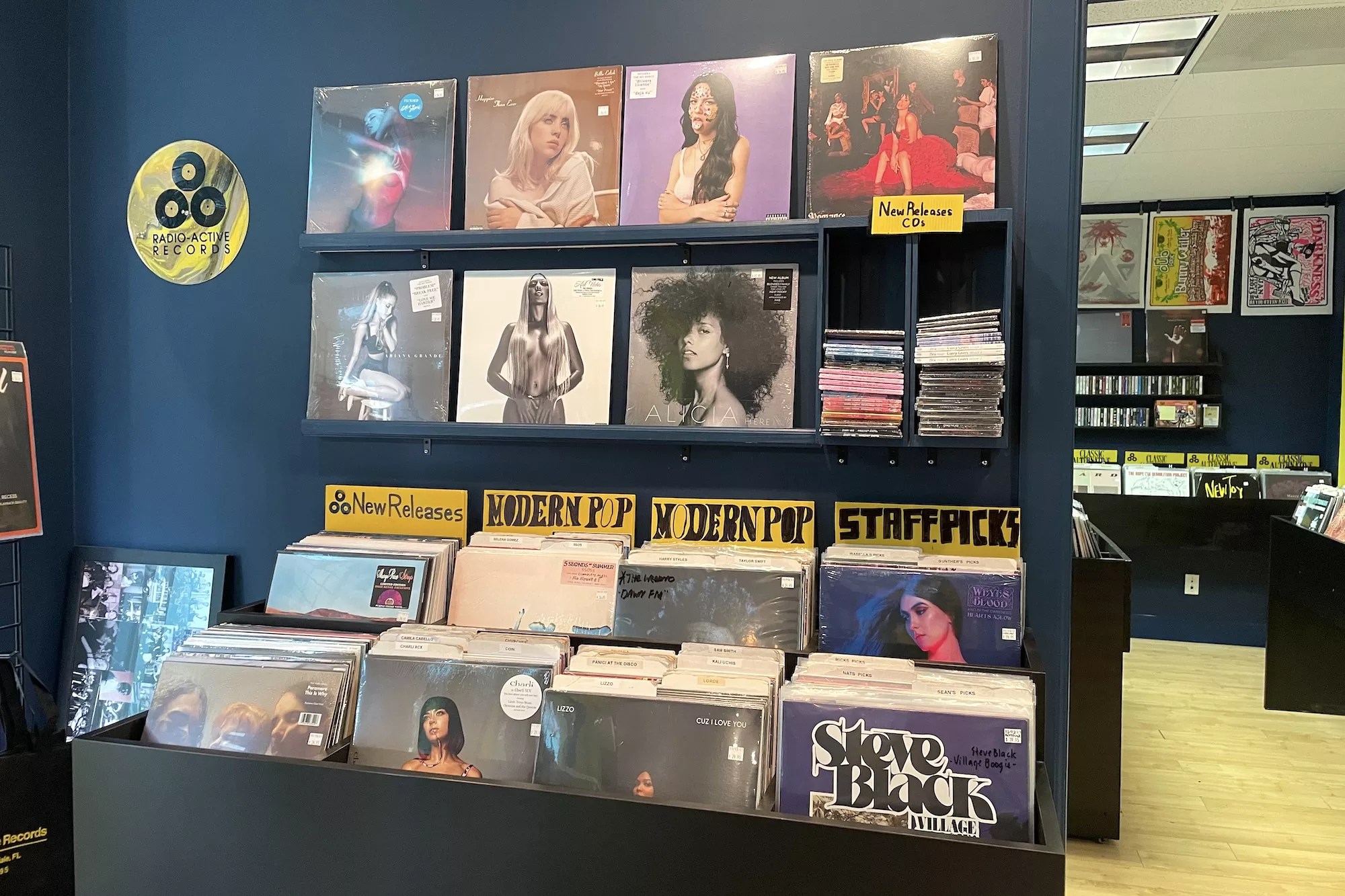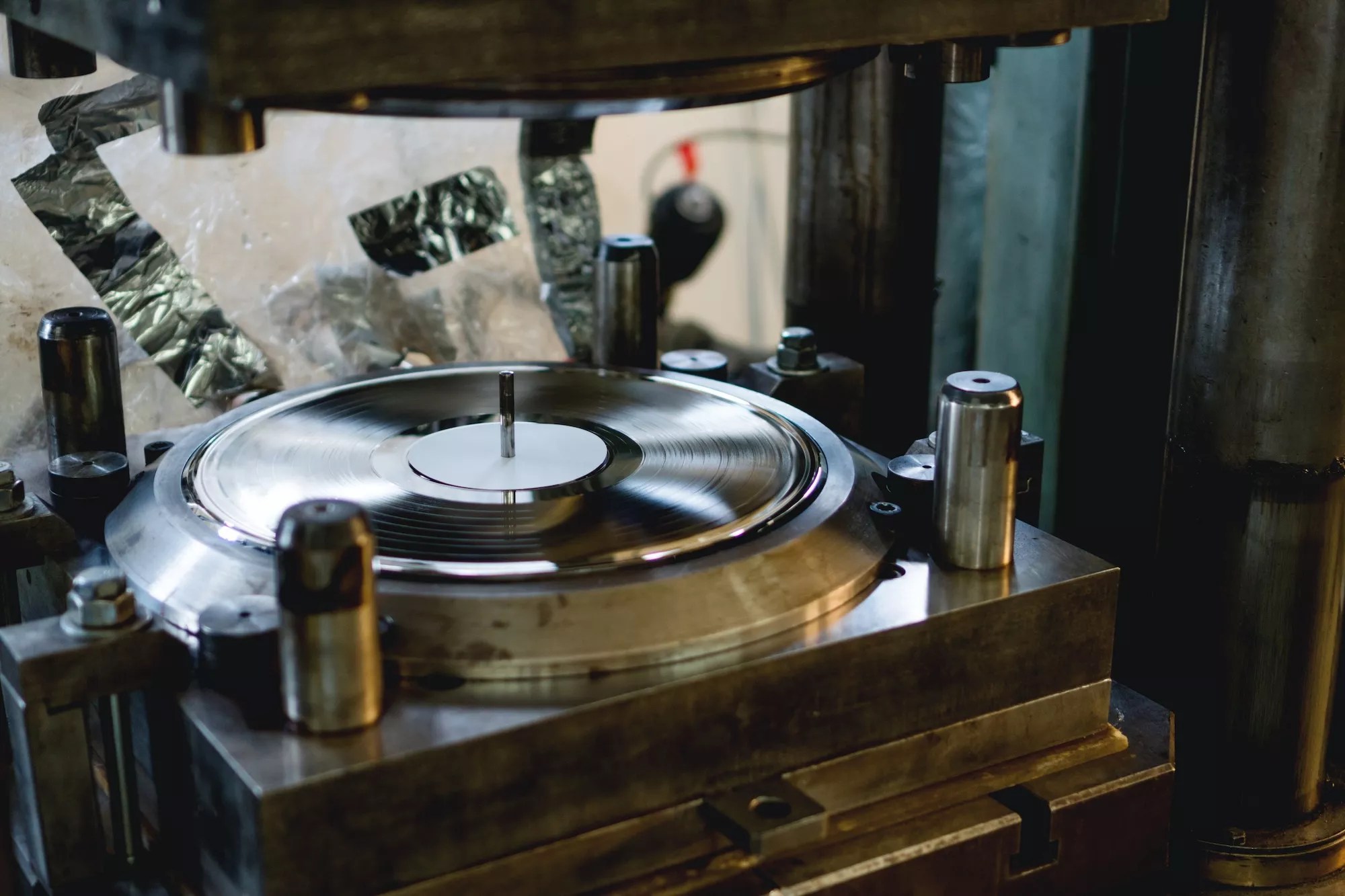
Radio-Active Records photo

Audio By Carbonatix
By the time Taylor Swift released her 11th album, The Tortured Poets Department, on April 19, most Swifties who wanted a physical copy had already preordered directly from Swift’s online store in February or during one of the several special-edition flash sales the pop star announced over social media in the lead-up. There was also a Target exclusive – a “phantom” clear vinyl, 24-page jacket, rare photos, a replica of Swift’s handwritten lyrics, and a bonus track – that was available to preorder online.
But if you wanted to support your local independent record store with your preorder, you were out of luck. Shops were under an embargo that forbade them from the album until the official release date.
The practice isn’t new, nor is it unique to Swift. Beyoncé’s recent Cowboy Carter rollout followed the identical pattern. It’s called direct-to-consumer (D2C) and involves artists setting up their own online stores to sell albums and merch directly to fans, often enticing ardent supporters to purchase multiple copies of the record with “exclusive” variants – a practice pop singer Billie Eilish recently spoke out against, citing it as unsustainable and wasteful.
The new business model likely stems from the realities that face the music industry, from low album sales to streaming services that pay scant royalties, which leaves touring and merch as the only ways musicians can earn a living. But it also hurts independent record stores, many of which existed long before vinyl’s resurgence and, some might argue, kept the format alive during the heyday of CDs and the early adoption of MP3.
Earlier this week, 70 U.S. independent vinyl retailers an open letter to record labels, calling for an end to the practice of preselling records exclusively through direct-to-consumer channels. “While we understand the commercial ‘first to market’ advantage benefit it provides yourselves, it ultimately undermines the principles of fairness, inclusivity, and accessibility that are fundamental to the spirit of music itself,” the letter states.
The letter, which was drafted by Rough Trade, a London-based record store in operation since 1976 with an outpost in New York City, described the current model as “a two-tiered system that privileges certain consumers over others. This not only fosters feelings of exclusion and frustration among music enthusiasts but also perpetuates inequalities within the industry. Independent retailers, in particular, are disproportionately affected by this practice, as they often lack the resources and negotiating power to compete with larger chains or online platforms.”
The letter was co-signed by well-known record stores, including Amoeba Music, Reckless Records, and Grimey’s New & Preloved Music, and supported by the American Association of Independent Music (A2IM), an organization that represents more than 600 independent music labels. Close to home, South Florida record stores Radio-Active and We Got the Beats signed the letter.
Lolo Reskin, owner of Sweat Records in Little Haiti, says the problem of D2C and exclusive presales is not new. “It’s something we’ve always had to contend with along the way,” she tells New Times.
Radio-Active manager Natalie Martinez witnessed the shift to the exclusivity window a few years after joining the shop in 2010. “Back in the day, it was an honor for an artist to have their album in a record shop,” she says. “The artist and the label wanted the record shop to promote their record. Without that, you essentially weren’t even taken seriously.”

Despite offering an indie record store exclusive version of The Tortured Poets Department, Taylor Swift’s exclusive presale of her latest album didn’t allow for stores to take preorders ahead of its release.
Photo by Frazer Harrison/Getty Images
Defense Against D2C?
“Independents kind of march to the beat of their own drum,” says Mikey Ramirez, owner of Technique Records on 79th Street. “We’ve all figured out our ways of survival, especially post-pandemic.”
Adds Martinez: “We stay in our lane because we know that our income comes primarily from used records. In the shop, we’re 90 percent used records. We have a section in the corner where we carry new releases, and we try to do our part as an indie retailer. But it’s also kind of just like, why are we going to fight so hard for someone who doesn’t even want to acknowledge us?”
Despite their broader business model, Reskin, Ramirez, and Martinez say they’re sympathetic to the plight of their fellow indies who rely on sales of new vinyl.
“Indie record stores are crucial to their communities. They’re a crucial part of the music industry as a whole, and we need to be lobbying on our own behalf,” says Reskin. “We all look out for each other. It is a really cool community among many of the stores.”
Taylor Swift didn’t entirely abandon record stores with the release of The Tortured Poets Department, including a “ghost white” vinyl variant made available exclusively to independent retailers. There was also a Record Store Day exclusive that came with a handwritten note, addressed “From the Desk of Taylor Swift,” from Swift’s own pen.
“I was happy to get ten copies of each because I don’t want to shoot my shot to the point where I will be left with excess stock,” Ramirez says. “I know my market, and I know the neighborhood. I took 30 of those records, plus ten copies of the indie ghost vinyl. Sold through those, so I’m happy. But I know I’m competing with direct-to-consumer from the websites. I know I’m competing with a Target exclusive and every big-box retailer, so I don’t pay any mind to it. But that’s fine because that’s not necessarily what’s going to carry my business.”
For indie stores, D2C has made buying new releases a precarious process. If you don’t order enough, you leave money on the table. But if you order too much, you’re left with stock you can’t move. Ending presale exclusivity would help retailers better gauge how much they need to stock.
“Surveying how many preorders people would be interested in helps us as a small retailer because that’s a lot of money for new releases, and it’s not returnable,” Martinez says. “So if I order 50 copies of the Taylor Swift, I can’t return them if the Swifties go somewhere else to get those records.”

With streaming services paying artists very little, the music industry has embraced the vinyl record as a way to sell merchandise to fans.
Photo by StockRocket/Getty Images
A High-Stakes Business
There’s a lot of money to be made on vinyl sales, and artists and record labels know that. While streaming continues to dominate consumption, vinyl has been experiencing a resurgence. As New Times previously reported, 2023 marked the third consecutive year in which vinyl records outsold CDs and the 18th consecutive year that vinyl album sales grew in the U.S., according to music data-tracking firm Luminate. When tallying up all digital and physical albums sold in 2023, vinyl made up 47.1 percent.
Studies also show that today’s vinyl boom has been aided by acts like Swift and Harry Styles, who’ve embraced the format, and retailers like Target and Walmart that stock records in their stores. In fact, Swift’s discography accounted for 7 percent of vinyl sales in 2023, or one out of every 15 vinyls sold.
Indie retailers, though, see themselves as spaces where music thrives and is celebrated – a role D2C and big-box retailers can never replicate.
“Big-box stores are not really engaging with the customers,” Reskin asserts. “Low-price CDs or vinyl are a way to get people in the door to buy towels and candles and computer printers and stuff. Whereas we live, eat, and breathe music. People come in for our expertise because they know we’re going to have indie exclusives, and they know we’re going to have an awesome staff who, you know, can recommend something else that will blow their mind.”
And if last month’s Record Store Day is any indication, independent shops can still rely on loyal customers who appreciate the shopping experience.
“We just had Record Store Day, and I thought, compared to last year, that there’s no fucking way we’re going do what we did last year because we did so well, and the world is in an even shittier place now,” Ramirez says. “But by the end of the day, not only did we match the numbers, but we exceeded them.”
“It shows the loyalty and impact that these stores have on the local community because they’re being honest with the consumers. I appreciate the people who keep us going; I appreciate the community. I appreciate the fact that there are all these different stores in South Florida. None of those stores are competition – those stores are allies.”